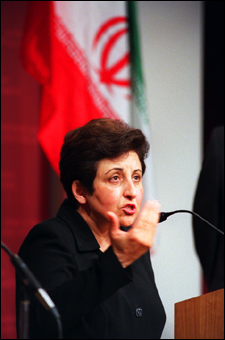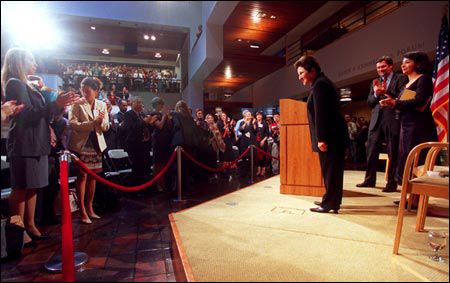Peace prize winner at JFK Jr. Forum
Iranian Nobelist Ebadi criticizes U.S. intervention in Iraq
Leaders cannot impose democracy and human rights on people by force, any more

than Lenin, Stalin, or Hitler were able to achieve their political ends through violence and oppression, according to Shirin Ebadi, the Iranian lawyer and human rights activist and recipient of the 2003 Nobel Peace Prize.
Ebadi, the founder of the Association for Support of Children’s Rights in Iran, spoke Tuesday (May 11) at the Kennedy School’s JFK Jr. Forum. Beginning her talk with a discussion of the failures of 20th century dictatorships, she argued the point that force and violence, even when undertaken with good intentions, can never succeed in achieving their intended objectives.
“If people were killed and heinous crimes were committed, it was with good intentions in their [the dictators’] minds, the intention to bring about the welfare of their people,” Ebadi said. “But they did not succeed. The reason was that they neglected a key principle, the need to respect the free will of the people.”
Ebadi, a short, dark-haired woman, spoke in Persian, but the earnestness and moral authority of her words were evident even to those who had to wait for the English translation. The bursts of applause that greeted many of her statements before the translator rendered them into English, revealed that a large portion of the audience were fellow Iranians.
Although most of Ebadi’s comments seemed to be aimed at the American intervention in Iraq, she also extended her criticism to oppressive theocracies like the one that has ruled her own country since the fall of the Shah.
“The mistake that some religious governments make is that they want to take their people to heaven by force, but a heaven that is forced on you is hell.”
The first Muslim woman and the first Iranian to receive the Nobel Peace Prize, Ebadi was also the first female lawyer in Iran to become a judge. She was appointed president of the Tehran city court in 1975. With the advent of the Islamic republic in 1979, however, she was forced to resign when the ruling clerics decided that women were too emotional to be judges.
She continued to practice law, however, often taking on politically sensitive cases in which she defended the rights of women, children, and political dissidents. In 2000, she and another lawyer were accused of distributing a videotaped confession by a member of a vigilante militia involved in violence against reformers. Ebadi received a 15-month sentence, which was eventually suspended.

Regarding the U.S.-led invasion of Iraq, Ebadi asserted that while there are probably few people in that country who were sorry to see Saddam Hussein overthrown, the idea of imposing democracy by force is fundamentally flawed and doomed to failure.
“Democracy is not an event that can happen overnight. Democracy is not a gift that can be delivered on a golden platter. Democracy is a historical process that needs to reach maturity over time.”
Instead of imposing democracy through military intervention, a nation that seeks to bring democratic government to an oppressed people should do so, she suggested, by providing “spiritual support to freedom-seeking people and democratic institutions so that the seeds of democracy can grow.”
Violent intervention, however well-intentioned, Ebadi posited, cannot bring about the desired result.
“Violence contaminates and is contagious. And it is as such that we see American soldiers being killed and, most regrettably, Iraqi prisoners being treated in a most shameful manner.”
Ebadi evoked the name of Eleanor Roosevelt and praised her efforts in the aftermath of World War II to convene an international group of “philosophers, lawyers, and intellectuals” to draft a universal declaration of human rights. The statesmen and politicians who are guiding American foreign policy today, however, “are behaving in a manner that undermines all her [Roosevelt’s] efforts. They must seek forgiveness from this great American woman for these actions and their consequences,” she said.
Only through the United Nations can intervention in the name of democracy and human rights be carried out, Ebadi said.
“If there is to be any corrective measure, it has to be done through the UN, and it is only then that democracy and freedom become legitimate causes and therefore defendable.”
Ebadi ended her talk with the hope that the UN will be strengthened and that the administration of Iraq will be left to the Iraqi people under the UN’s supervision, “so that American soldiers – your children – can return home healthy and alive.”
During the question-and-answer period, several audience members, some of whom identified themselves as Muslim women, asked Ebadi to clarify her views on the rights of women in Islamic societies.
To one woman who asked how Ebadi reconciled democracy and human rights with a passage in the Koran that sanctioned the beating of women for rebellious behavior, Ebadi replied that Islam has a system of secondary laws whose purpose is to adapt the primary laws to changing circumstances. For example, she said, Muslims are instructed to fast from sunrise to sundown during the month of Ramadan, but this would cause death in the event that a Muslim found himself at the North Pole.
“The key question is, why don’t we refer to secondary laws when speaking about the rights of women? This is not because these rights are incompatible with Islam, but because of patriarchal cultures that override the will of the people in Islamic societies.”




